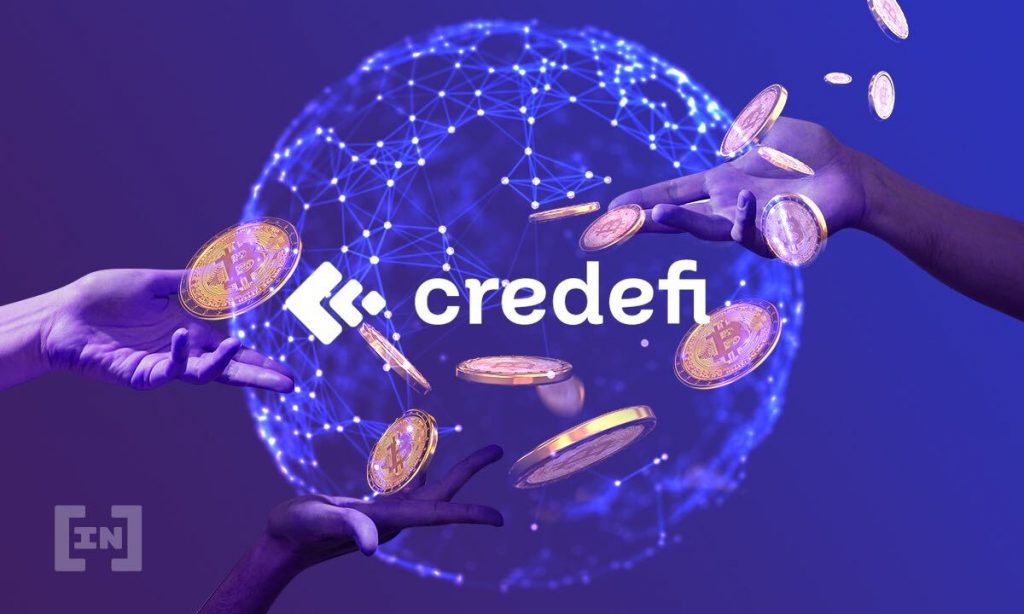Credefi AMA Session With BeInCrypto

Hi Everyone! Welcome to another BeInCrypto AMA Session! Today we welcome Ivo (@ivogrigorov), CEO of Credefi.
For the uninitiated, Credefi prides itself as “the world’s most advanced DeFi P2P lending platform.”
BeInCrypto (BIC): COMMUNITY: Here is how things will work. I’ll have 10 questions for him. After these questions, he will pick up 5 out of all the questions you asked before the session. Good luck to you all!
(This AMA session has been edited for clarity.)
BIC: I would like to ask you something general to kick things off, so please provide some personal background as well as some references you guys looked at before creating Credefi.
Ivo: I was in charge of the credit assessment operation of a leading Greek bank with over €3 billion under management. Back in the day, I was also working for the Bulgarian Central Bank and a €600 M state-owned fund investing in VCs and fintech startups. Throughout these years I have noticed many deficiencies in the process of funding SMEs that haven’t been properly addressed by the legacy financial markets.
Having been in crypto since 2017, I have seen too much speculation in the space and excessive volatility that every protocol is suffering from.
That’s where my motivation came from to develop a protocol whose performance is not dependent on the high volatility in the cryptomarkets and at the same time can open the doors for SMEs to tap into the endless funding and technology advancements opportunities that crypto offers
BIC: I really believe you are trying to liberalize and decentralize the banking industry, just like you say in your whitepaper. However, how does that work in practice, for all the users? How would you briefly describe Credefi in terms of its main purpose within the current market?
Ivo: Credefi is a hybrid FinTech solution / DeFi protocol connecting crypto lenders of stablecoins with SME borrowers from the real economy. Credefi’s platform enables decentralized and secured lending to portfolios of business projects or individual companies, protecting lenders while providing them fixed APY.
The protocol resolves major issues in both the DeFi and TradFi spaces.
In crypto world the decoupling of DeFi has been a buzzword for a while, however, in reality, DeFi yields are inconsistent, fragile, and eventually evaporate in bear markets – the aftermath of DeFi Winter and the market drop in May ’21 are very strong evidence of that. It’s obvious that DeFi borrowers are speculative, fickle, and cannot satisfy the DeFi lending supply.
Small and medium enterprises are historically underserved by traditional banks and even if they get access to borrowing it usually comes at high-interest rates and collateral requirements. There are insufficient lenders to satisfy the SME borrowing demand and that’s the reason why more and more small companies are using alternative lending solutions such as peer-to-peer and crowdlending/crowdfunding which are billion-dollar industries in the US and EU. The funding of SMEs is a high priority for the European Union and innovations like the Open Banking standard open a completely new horizon for FinTech funding of SMEs. The next logical step would be to utilize the capital available in DeFi with the trillion-dollar legacy financial markets that currently remain virtually untapped by the DeFi space.
We believe that if SMEs need consistent lenders and DeFi needs consistent borrowers, we can bring these two together so they can stabilize each other and have a symbiotic relationship – when crypto markets go South and DeFi yields drop to low single digits, Credefi will be the shelter for stablecoin holders wanting to earn stable APYs of 10% and above.
BIC: Thanks for this intro! As far as I know, Credefi’s platform will be developed in three phases. Each phase introduces different services to the CREDI holders and users, right? Could you please summarize what we’ll have in each phase?
Ivo: Absolutely. We will be rolling the protocol out in three stages:
Stage 1: Credit portfolios that are divided into 4 categories depending on the R of the underlying projects. Each portfolio will provide fixed APYs to lenders and LPs.Stage 2: Peer-to-peer lending incentivizing lenders and borrowers to negotiate directly the terms and conditions of every transaction. Still, Credifi will do a credit scoring of each borrower to ensure stability of the protocol and mitigate the default rates. Stage 3: Trade finance in the form of underwriting letters of credit and credit lines for cross-border and domestic transactions.
We will kick-off the protocol’s operations with a guarded launch starting with the Credit Portfolios product line. The P2P and Trade Finance segments will be introduced in H2 2022.
BIC: I see. Would you mind talking a little bit more about some killer features we’re going to see on Credefi? Maybe those resources that really make you stand out
Ivo: We’ve designed the USPs of Credefi around our main priority, namely security for the lenders and liquidity providers. So that’s why we have created a 3-layer mechanism to protect our lenders:
In-house proprietary credit scoring based on the 40+ years experience of the team and our cooperation with Experian which is one of the “Big Three” credit-reporting agencies aggregating data for more than a billion businesses and customers across 40 countries. Crypto and real-world collateral. The real-world asset collateral will be managed and administered by a licensed financial institution operating in the European Union. The value of the real-world collateral will be validated on-chain using Lithium Finance as one of our oracles.Security module providing stability to the protocol by staking our utility token CREDI.
BIC: Partnerships are an essential part of the whole strategy for any project. Can you please name some of the latest partnerships you guys made? What about the importance of them and what do you expect to get from them aiming for Credefi’s growth?
Ivo: We’re proud to have strategic partnerships with companies from both the TradFi space and crypto.
We’re the very first blockchain-related project to have a strategic partnership with Experian – one of the Big Three credit reporting agencies, aggregating data for over 1 billion companies and customers across 40 countries. Experian will validate and calibrate Credefi’s credit scoring models. Also, Experian and Credefi will cooperate on the topic of innovations in finance stemming from the Open Banking protocol that will require traditional banks to integrate their APIs with those of FinTech solutions like Credefi, thus giving Credefi access to traditional banks’ massive customer base and to key information that will help Credefi expand its customer base, borrowing decisions, and onboarding new SMEs to the protocol and DeFi in general.
We also have great crypto partnerships that are essential for the Credefi’s ecosystem such as Polygon, Reef Finance, SupraOracles, Lithium Finance, and many more currently in the making.
BIC: Cool. It’s time to introduce your native token to our community! What do you have to say about CREDI in terms of tokenomics and how does it fit within your ecosystem?
Ivo: Our tokenomics is designed and inspired by the latest trends and developments in the DeFi space. We have implemented a 2-token economy model, which secures and stabilizes the platform while increasing APY for our stakers and token holders. Through staking our native token CREDI in our ModuleX, you will be able to receive higher APY as well as mint our governance token xCREDI. Additionally, we have implemented a buyback and burn mechanism of xCREDI, in order to return part of the revenue generated by the protocol.
For a deep dive into the tokenomics, we welcome everyone to have a look at the Medium article here.
BIC: Several projects currently use some strategies to maximize the number of holders. What are some of the benefits for those ones who hold your tokens? Do you also have a similar strategy?
Ivo: We have prepared exclusive staking incentives for our early CREDI holders allowing them to obtain our governance and profit sharing token xCREDI at preferential rates. Please see how this one is working here. Once the protocol is life, we’ll be introducing further incentives and rewards for the early CREDI holders that also actively participate in the platform and take part in the lending activities.
BIC: What can you tell us about your recent IDO? Also, what’s the current status in case anyone wants to purchase your tokens? I bet some of our members are curious about how to buy some CREDI right now 🙂
Ivo: We completed a rather successful IDO with Cardstarter last week. We had more participants than some of the most successful projects that launched through Cardstarter. Currently, we’re in negotiations with several CEXes as to an IEO. We aim for the listing details to be finalized soon. We welcome all Credefi enthusiasts to join our Official Telegram Group for further details on the upcoming listing.
BIC: Great! I took a look at your roadmap and it’s fully packed with activities. What do enthusiasts/investors can expect when it comes to future plans? What do you have in mind for Credefi in the next few weeks or months?
Ivo: Well, you said it, the program is pretty packed and the list of developments is rather long, but here are some of the key highlights:
1. CEX and DEX listing
2. Introduce additional CREDI staking opportunities and pools
3. Launch of Credefi’s Stage 1 – Credit Portfolios
4. Start integration with Solana and Cardano
5. Prepare for the launch of Credefi’s Stage 2 – Peer-to-peer
BIC: Awesome, that’s it. I’m quite sure we’ve covered all the main topics today. Could you please share all the links to your Social Media channels so that our community can get to know Credefi a little better?
Ivo: Thanks for that, much appreciated. Please follow us at:
Credefi’s Official Group Credefi’s Official News Channel Credefi’s Twitter Account Credefi’s Medium
We’ll be happy to see you all folks there :).
Community (COM): Through TRADE FINANCE Credefi is aimed to combine traditional banking instruments with the aspect of decentralization, offering the full length of services to its customers. Can you explain to us more about this point, how exactly you plan to combine traditional banking with the aspect of decentralization?
Ivo: Trade Finance is an essential tool that enables international trade, so far these services have been offered only by Banks and are often inaccessible to the average SMEs. This poses a big obstacle for them to import or export their products, having to perform an upfront payment which drains them from liquidity and hence leads to poor cash flow management. Banks have two products which are used Letters of Guarantee and Letters of Credits, the way Credefi revolutionizes this is that it gives the tools and the power to underwrite the above and finance international trade deals directly to the users and our Liquidity Providers
COM: Have you done any bugs testing of your platform? What are the Audit conditions of your project and any bugs and vulnerabilities found yet?
Ivo: Our development team is constantly looking for and acting to resolve any potential vulnerabilities, however small they may be. We would also conduct a bug bounty program after IDO and implement all relevant findings to ensure maximum security of our platform when we launch.
We have recently passed a smart contract audit with Armors Lab – a leading provider of smart contract audit services with a very good reputation. We will be publishing the report soon – please follow our official channels for the latest updates.
COM: What is Your project revenue model and what are the ways to make a profit?
Ivo: We believe one of the goals of DeFi is to cut the middleman as much as possible and allow money to flow seamlessly and without friction (fees). That’s why we do not do arbitrage between lenders and borrowers and do not have an interest spread – we are not a bank after all. Also, we do not leverage our lenders’ capital by staking it on other platforms, etc. – funds go straight to SMEs and lenders have full transparency on where their money is deployed and what projects and companies they are funding.
Of course, the platform has to earn revenue to keep the lights on and we do so by charging borrowers a fee when they obtain a loan – this is our only source of revenue.
COM: I have read that CREDI token holders can contribute to the security of the system. How will we contribute to security and how much xCREDI will we be rewarded for?
Ivo: Our tokenomics is designed and inspired by the industry leaders like AAVE and SUSHI. We have implemented a 2-token economy model, which secures and stabilizes the platform while increasing APY for our stakers and token holders. Through staking our utility token CREDI in Module X, users will be able to receive higher APY as well as mint our governance token xCREDI. Additionally, we have implemented a buyback and burn mechanism of xCREDI, in order to return part of the revenue generated by the protocol to users.
CREDI is our utility token that will be used to reward activity on the platform and act as an additional security layer by being staked in Module X. We will have a tiered structure for lenders and borrowers, whereby the more CREDI you hold (and stake), the better terms you will receive.
xCREDI is our governance token that will be minted only by staking and burning CREDI in Module X. xCREDI holders will be able to shape the path of Credefi in the future as we move towards a completely decentralized platform.
COM: Lenders are always at risk of credit default. The higher the loan APY, the higher the risk. Can CreDeFi (10%) sustain APY? What kind of protection mechanism do you have to protect lenders?
Ivo: Our APYs are based on real-life SME lending in different business situations – need of more working capital, launching a new product line, building a new real estate development, requiring bridge financing for a short period of time before cash inflow, etc. Bridge funding for example often comes at high-interest rates which SMEs are happy to pay because of the short period of time of these loans – the percentage interest rate may be high, but the total amount of interest paid is low.
Lenders always face the risk of loan default – it’s not a risk-free investment and of course the higher the loan APY, the higher the risk. However, we have structured a three-layer protection mechanism to protect our lenders as much as possible:
Layer 1 – all borrowers and loan applications are professionally assessed (with validation by Experian) to come up with the “right” amount of interest and collateral needed.
Layer 2 – all loans on our platform will be collateralized, using both crypto and real-world assets as collateral.
Layer 3 – our Security Module that will bridge the time gap between a borrower stopping payment and their collateral being liquidated and funds returned to lenders.
Disclaimer
All the information contained on our website is published in good faith and for general information purposes only. Any action the reader takes upon the information found on our website is strictly at their own risk.













